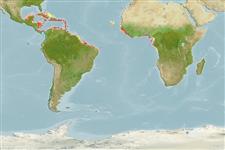Common names from other countries
>
Ovalentaria/misc (Various families in series Ovalentaria) >
Pomacentridae (Damselfishes) > Glyphisodontinae
Etymology: Abudefduf: Arabic, abu = father; this fish is the leader of the reef against other species (Ref. 45335).
More on authors: Müller & Troschel.
Environment: milieu / climate zone / depth range / distribution range
Ekologi
marina revassocierade; ej vandrande; djupintervall 1 - 5 m (Ref. 9710). Subtropical; 24°N - 7°S, 133°W - 62°E (Ref. 56030)
Western Atlantic: southern Florida, USA and the Caribbean Sea. Reported from northern South America (Ref. 5217). Eastern Atlantic: Cape Verde and from Senegal to Angola.
Size / Vikt / Age
Maturity: Lm ? range ? - ? cm
Max length : 25.0 cm TL hane/ej könsbestämd; (Ref. 7251); common length : 20.0 cm SL hane/ej könsbestämd; (Ref. 3139)
Short description
Bestämningsnycklar | Morfologi | Morfometri
Taggstrålar i ryggfenan (totalt) : 13; Mjukstrålar i ryggfenan (totalt) : 11 - 12; Taggstrålar i analfenan: 2; Mjukstrålar i analfenan: 10. Caudal fin lobe rounded (Ref. 7247). A heavy-bodied, compressed species; tawny yellow above, paler below, with 5 or 6 dark bars wider than interspaces between them (Ref. 26938). A sixth faint bar or dark saddle-like mark may be present on upper part of caudal peduncle; a prominent black spot at upper base of pectoral fin (Ref. 13442).
Adults inhabit rocky inshore reefs. They prefer wave-cut rock ledges or limestone shorelines and tide pools in regions with surf. Feed mainly on algae but adults also consume Zoanthus and hydroids while juveniles also feed on copepods (Ref. 9626). Oviparous, distinct pairing during breeding (Ref. 205). Eggs are demersal and adhere to the substrate (Ref. 205). Males guard and aerate the eggs (Ref. 205). Marketed fresh (Ref. 3139).
Life cycle and mating behavior
Maturities | Reproduktion | Spawnings | Egg(s) | Fecundities | Larver
Oviparous, distinct pairing during breeding (Ref. 205). Eggs are demersal and adhere to the substrate (Ref. 205). Males guard and aerate the eggs (Ref. 205).
Allen, G.R., 1991. Damselfishes of the world. Mergus Publishers, Melle, Germany. 271 p. (Ref. 7247)
IUCN Red List Status (Ref. 130435)
CITES (Ref. 128078)
Not Evaluated
Threat to humans
Harmless
Human uses
Fiskeri: mindre kommeriell
Verktyg
Special reports
Download XML
Internet-källor
Estimates based on models
Preferred temperature (Ref.
115969): 26.3 - 28.2, mean 27.5 (based on 581 cells).
Phylogenetic diversity index (Ref.
82804): PD
50 = 0.5000 [Uniqueness, from 0.5 = low to 2.0 = high].
Bayesian length-weight: a=0.02188 (0.00932 - 0.05134), b=3.08 (2.89 - 3.27), in cm Total Length, based on LWR estimates for this Genus-body shape (Ref.
93245).
Trofisk nivå (Ref.
69278): 2.1 ±0.1 se; based on diet studies.
Resiliens (Ref.
120179): Mellan, lägsta populationsfördubblingstid 1,4-4,4 år (Preliminary K or Fecundity.).
Fishing Vulnerability (Ref.
59153): Low vulnerability (15 of 100).
